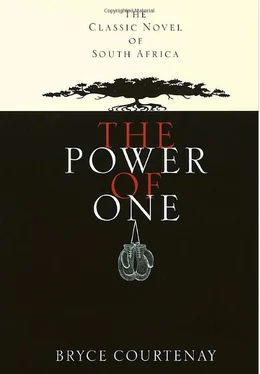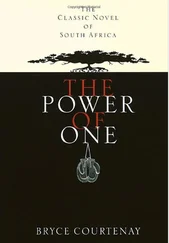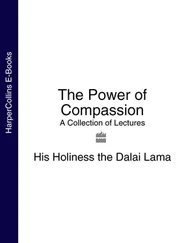Брайс Куртенэ - The Power of One
Здесь есть возможность читать онлайн «Брайс Куртенэ - The Power of One» весь текст электронной книги совершенно бесплатно (целиком полную версию без сокращений). В некоторых случаях можно слушать аудио, скачать через торрент в формате fb2 и присутствует краткое содержание. Жанр: Современная проза, на английском языке. Описание произведения, (предисловие) а так же отзывы посетителей доступны на портале библиотеки ЛибКат.
- Название:The Power of One
- Автор:
- Жанр:
- Год:неизвестен
- ISBN:нет данных
- Рейтинг книги:3 / 5. Голосов: 1
-
Избранное:Добавить в избранное
- Отзывы:
-
Ваша оценка:
- 60
- 1
- 2
- 3
- 4
- 5
The Power of One: краткое содержание, описание и аннотация
Предлагаем к чтению аннотацию, описание, краткое содержание или предисловие (зависит от того, что написал сам автор книги «The Power of One»). Если вы не нашли необходимую информацию о книге — напишите в комментариях, мы постараемся отыскать её.
The book is made to movie with the same name.
The Power of One — читать онлайн бесплатно полную книгу (весь текст) целиком
Ниже представлен текст книги, разбитый по страницам. Система сохранения места последней прочитанной страницы, позволяет с удобством читать онлайн бесплатно книгу «The Power of One», без необходимости каждый раз заново искать на чём Вы остановились. Поставьте закладку, и сможете в любой момент перейти на страницу, на которой закончили чтение.
Интервал:
Закладка:
FIFTEEN
We were reasonably safe the month after the piano stool incident as the inspector of prisons was due to arrive and Lieutenant Borman had the job of seeing that the place was spick and span, with fresh whitewash everywhere you looked. Much to Doc’s annoyance even the stones bordering his cactus garden were whitewashed. He was prepared to accept whisky bottles outlining his paths but painting real stones seemed to him an insult against nature. Fresh gravel was brought into the inner courtyard together with several loads of finely crushed iron pyrites and mica with which a large letter ‘B’ was formed in the centre. The darker colour and sheen from the mica and pyrites mix made the letter shimmer against the almost white gravel. The ‘B’ of course stood for Barberton. This was the lieutenant’s idea and he spent hours supervising the old lags sweeping and raking, until it was perfect. I must hand it to him, it did look very nice. Gert said the Kommandant was particularly pleased and Borman was up to his eyeballs in his good books. The prison corridors smelt of polish and the cells of Jeyes Fluid disinfectant. Window ledges were painted prison blue and everywhere you went smelt of new paint. But it was done early so the smell would have gone by the time the brigadier arrived. New canvas uniforms were issued to the old lags to be worn only during the visit. This was because they were doing all the painting and cleaning and their old patched and worn uniforms had paint on them and would give the game away. The Kommandant wanted the brigadier to think that everything was normal and that he could have popped in any old time and found things just the same. After the inspection, the lags handed back their new uniforms and wore their old patched and worn clothes until they finally fell apart.
Captain Smit had arranged the usual boxing exhibition and for weeks the Kommandant spent most of his mornings, as he did before every inspection, practising his pistol shooting on the pistol range behind the warders’ mess.
The rapidly approaching VE day was a matter of concern to the Kommandant. If it arrived before the brigadier’s visit then the truly cultural part of the programme would disappear with the release of Doc. He had tried to elicit a promise from Doc that, should this occur, he would return to the prison and play for the inspector. But Doc had not spent over four years in prison for nothing and he had learned the rules of prison life where everything is in return for something else. The Goldfields News had already printed a picture of the Kommandant above a piece by him saying that Doc was in prison because he was a German and that the moment Germany surrendered Doc would be released. The Kommandant couldn’t go back on his word without losing face. This he would not allow to happen. Doc’s price for staying over, if necessary, caused an uproar among the warders but as far as the Kommandant was concerned no price was too high for a smooth visit. Doc asked if he could give a concert for all the prisoners.
On Sundays, being God’s day, the prisoners did not go out in work gangs. Instead they were locked in their cells and fifty at a time were allowed in the exercise pen, a high-walled enclosure of brick and cement about the size of two tennis courts. This was done tribe by tribe, each tribal group allotted ninety minutes. First the Zulus, followed by the Swazis, then the Ndebele, Sotho and Tsonga. The Boers had long understood the antipathy each tribe has for the other, and by keeping the tribes separated in prison they maintained the traditional tensions between them. This was thought to lessen the chances of a mass uprising or a prison strike.
Doc told me how each Sunday he would take a position in the guard tower overlooking the exercise pen to listen to them. Each tribe would use much of the ninety minutes allotted to them singing together, and he soon learned which tribal song each tribe liked best. He had written out the music for it, and then he had composed a piano concerto which represented, in melody terms, each of these songs. Doc said that he had never heard such magnificent harmony. Most of the songs were very beautiful and even though he did not understand the words, he could hear in them the people’s longing for their homes, their people, the comfort of their fires, and the lowing of the cattle in the evening. He would sigh and say that his concerto could never capture the beauty of the original voices. He called it ‘Concerto of the Great Southland’. It was this which he hoped to play to all the prisoners as his tribute to them before he left the prison.
The idea was for Doc to play the concerto through first, each movement in effect being one or more of a particular tribe’s songs. Then on the second time through the tribe whose movement it was would sing the song to Doc’s accompaniment on the Steinway. In this way each of the tribes represented in the prison would participate in the concert.
Once the Kommandant had agreed that the concert could go ahead, a great deal had to be done. No rehearsal was possible of course, but through Geel Piet each of the tribes was told which song was needed and the exact time it should take to sing. At night Doc would play the various songs fortissimo with all the hall windows open so the sound carried to the cell blocks. The warders claimed you could hear the cockroaches scratching as the prisoners strained to hear the music.
Because Doc would be at the piano, he decided I should conduct. This I would do in the simplest possible sense, signalling the piano breaks and the pianissimo as well as the fortissimo to the choir. After some weeks I was quite good at taking my directions from Doc and we went through the concerto during morning practice until I knew what every shake and nod of his head meant. Geel Piet had also taken basic instructions back to the prisoners so supposedly they knew what my hand signals would mean. Had Doc proposed that I assume the role of conductor in front of a white audience I could not have done so, but such is the nature of white supremacy in South Africa that I thought little of standing up in front of three hundred and fifty black prisoners and directing them.
Geel Piet informed me of the mounting excitement among the inmates. For several weeks the warders had an easy time, they simply had to threaten an inmate with non-attendance at the concert to get him to comply with any instruction. When the news spread that the Tadpole Angel would be directing the people in the singing indaba, it was immediately assumed the concert had a mystical significance and I had chosen this time to meet all of the people. Work time was used as practice and farmers and the people at the saw mills who hired gangs spoke of singing from dawn until dusk. Even the dreaded quarries rang with the songs of the tribal work gangs. Concerto of the Great Southland was being wrought into being, a musical jigsaw where, on the big night, all the pieces would be brought together under the magic spell cast by the Tadpole Angel.
Lieutenant Borman had tried his best to prevent the concert from taking place, but Captain Smit seemed to have decided that it was a good idea, perhaps for no other reason than that the concert was opposed by Lieutenant Borman. The two men had never liked each other and Captain Smit, who was not a member of the Oxwagon Guard, was said to have been bitterly opposed to the elevation of Borman to lieutenant.
The concert was to take place on the parade ground, and a special platform had been built in the carpentry shop to raise the Steinway above the level of the prisoners. It was proposed that each tribe would form a semi-circle around the platform with ten feet separating each group. Two warders carrying sjamboks would be stationed in this corridor to stop any monkey business. A double shift issued with extra ammunition would be on guard duty on the walkways along the wall, and throughout the concert spotlights would be trained on the prisoners.
Читать дальшеИнтервал:
Закладка:
Похожие книги на «The Power of One»
Представляем Вашему вниманию похожие книги на «The Power of One» списком для выбора. Мы отобрали схожую по названию и смыслу литературу в надежде предоставить читателям больше вариантов отыскать новые, интересные, ещё непрочитанные произведения.
Обсуждение, отзывы о книге «The Power of One» и просто собственные мнения читателей. Оставьте ваши комментарии, напишите, что Вы думаете о произведении, его смысле или главных героях. Укажите что конкретно понравилось, а что нет, и почему Вы так считаете.












